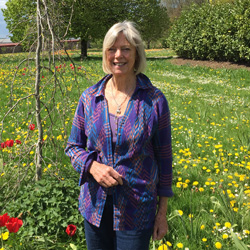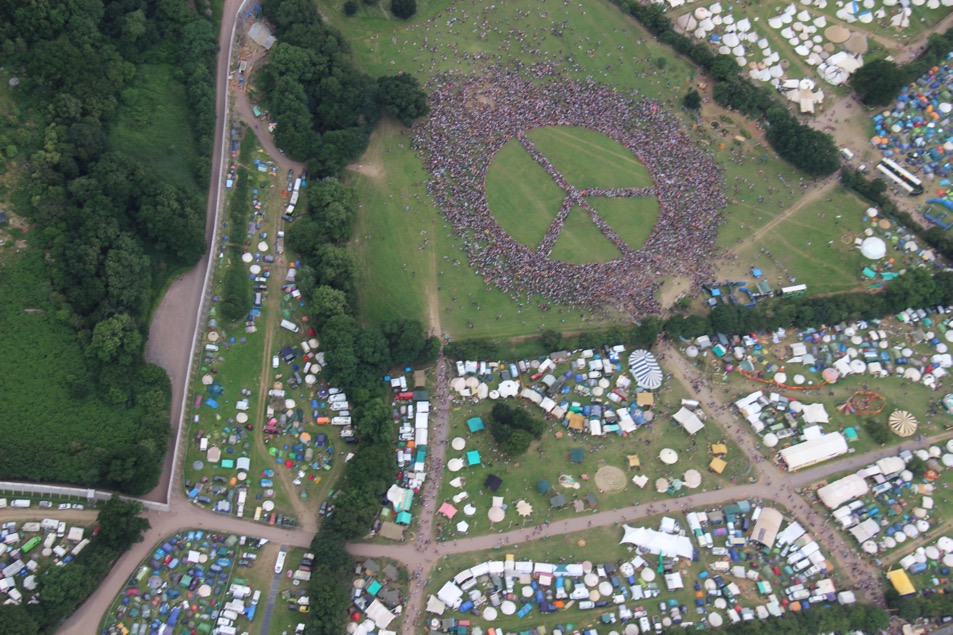This post is more than
Green Fields organiser Liz Eliot: “We can’t have our heads in the sand any more”
23rd June 2019
 Liz Eliot has been an environmental activist since the 1970s and an integral cog at Glastonbury, where she is Green Fields coordinator, for more than three decades.
Liz Eliot has been an environmental activist since the 1970s and an integral cog at Glastonbury, where she is Green Fields coordinator, for more than three decades.
We asked Liz to tell us more about Thursday’s Extinction Procession, which will culminate with a giant human sculpture of the Extinction Rebellion logo in the King’s Meadow, and to suggest ten simple ways we can all make a big difference.
So Liz, are you excited about the Procession?
Absolutely! We’re all coming together to send a message to the world. Starting up at The Park at 4pm and ending at the Kings’ Meadow in the Green Fields at 5.30pm, we’ll be marching together through the Festival – for our planet and for our future. We’ll have some wonderful speakers coming to The Park Stage to inspire us, before we head off through the Festival site to the Green Fields. The Extinction Procession will culminate there, where we will make a human XR sculpture – the symbol of extinction. We want to get across the message that we’ve not got long before our climate changes irreversibly and there just has to be a fundamental shift in the way we think and operate as a society.
What are you looking to change?
What we’ve got to do is change our mindset. We need to start to feel positive; to feel that we *can* make a difference. We need to feel hope because only with hope, will we begin to turn around our climate predicament.

The giant peace symbol in the Green Fields in 2017
It’s hard to escape the feeling that time is running out.
Time is short, but it has not run out yet. In fact, it feels like we are at an exciting turning point. With David Attenborough, the great Greta Thunberg and the current rise of Extinction Rebellion bringing the streets of London to a standstill and proliferating in towns everywhere, it feels as though there is a burgeoning awareness about what we as a society think is acceptable. And carrying on as we are now – living in this unsustainable way – is simply unacceptable. But if we can all make even small adjustments to the way we live our daily lives, these little ripples together will become powerful waves of change.
You have been working towards this for a long time.
I’ve been working for environmental agencies since the 70s. We were trying to show – even then – how the way we were living, clearing forests and destroying habitats, was affecting our climate. And we wanted our country to set an example to the rest of the world that we couldn’t go on living in this non-sustainable way; we couldn’t carry on being such heavyweight consumers. That was our message in the 80s and so on and so on. Until we wore ourselves out – almost, but not quite. And now it’s all reaching a climax.
So what next?
I feel now the urgency of what faces us is being understood. We can’t have our heads in the sand anymore – the tide is rising, literally! It is going to take a world movement for us to live sustainably. We need to change our culture, our mindsets and our habits. But it really is not as hard as you might think. And these changes will make life for all of us on our planet richer.
Liz’s 10 simple ways to make a huge difference
1. Communicate. Write to your politician to demand the use of renewable clean energy instead of damaging fossil fuels and ban the use of unnecessary plastic packaging. Pass the message on to friends and families. Join a climate change group to learn more.
2. Food. Eat less, eat healthy and shop locally. Cut back on meat.
3. Grow things. Grow plants and vegetables for you and flowers for the insects. A window box will take lettuces, herbs and a courgette plant; an old welly boot, a bush tomato. All plants absorb carbon dioxide.
4. Transport. Walk or use public transport where you can. If you need to use a car, choose electric or hybrid and eco drive to save fuel. Car share to make the most of your journey. Check your tyre pressure regularly to get the most out of fuel. And, of course, fly less.
5. Save water. Hold the dishwasher and washing machine until full. Make your showers shorter. Only boil the water you need to make a drink – all will save both water and electricity.
6. Use less electricity. Check your product energy efficiency, unplug appliances, chargers and wifi overnight and when you’re not using them.
7. Fashion. Buy more second-hand: it’s never been easier to buy pre-loved items. Buy quality above quantity; cotton is the world’s second-largest polluter. Mend what you can.
8. Avoid single-use disposables. From plastic to wet wipes, they are hugely polluting and their manufacture is a waste of natural resources.
9. Read. Research products; buzz words like eco, sustainable and biodegradable are not always what they imply.
10. Reduce. Reuse. Recycle.
